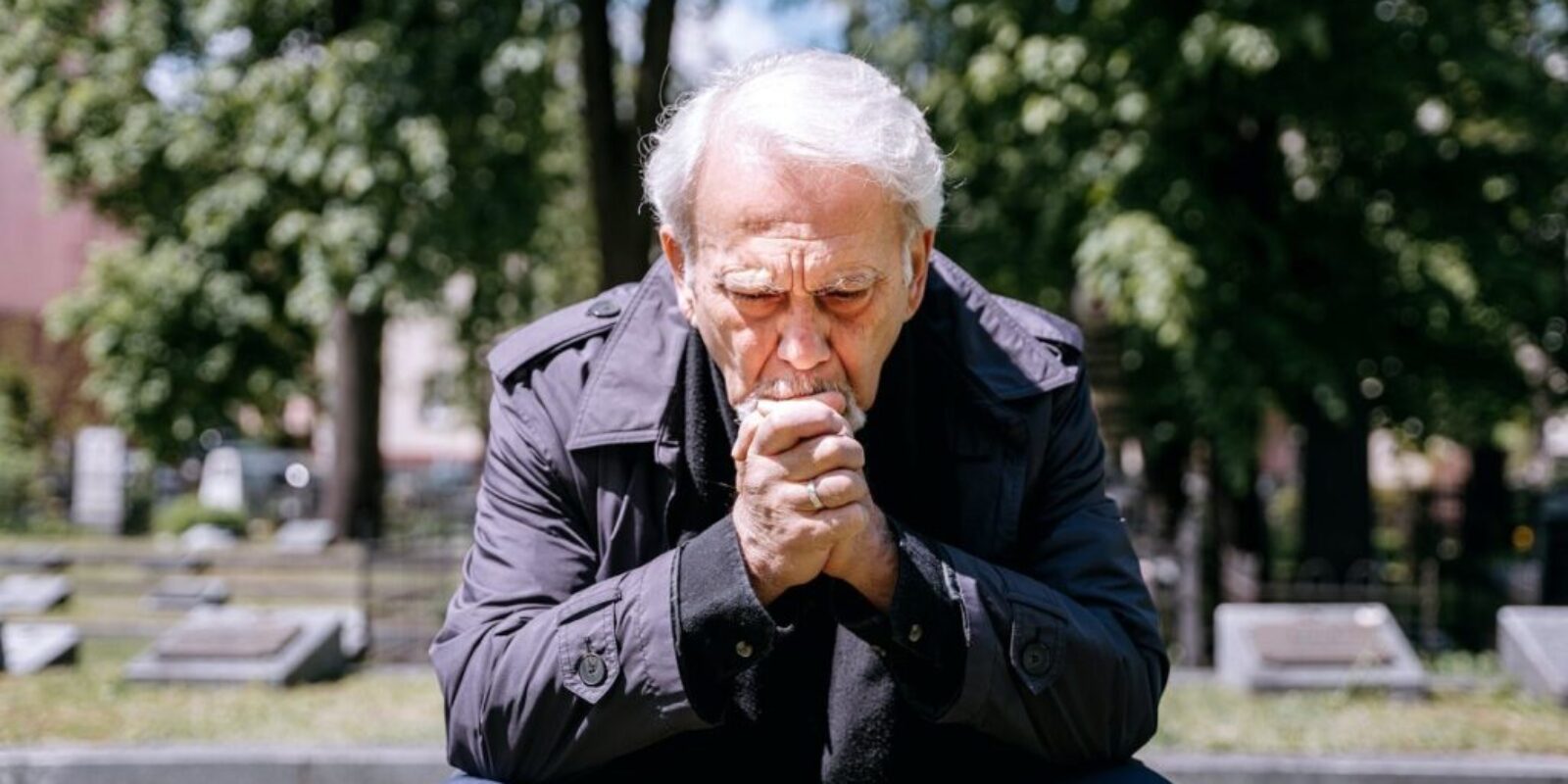Coping with loss in later life is harder and full of emotional pitfalls, isolation, and loneliness than grieving a loved one at any other stage in life.
Seniors dealing with grief, face a tough adjustment period. Family members and caregivers should be aware of this, as well as seniors who have recently lost a loved one. Keeping grief to yourself can pose risks.
Contents
- 1 Understanding and Managing Grief in Older Adults
- 1.1 Prefer to listen rather than read?
- 1.2 How Grief in Seniors Can Turn into a Disease?
- 1.2.1 Intense Grief Worsens the Declining Health of Many Seniors
- 1.2.2 Loss can Lead to Intense and Prolonged Grief in Seniors
- 1.2.3 People Coping with Loss in Later Life Often Feel Exhausted
- 1.2.4 Grieving Seniors are More Likely to Experience a Decline in Mental Functions
- 1.2.5 Grief Can Worsen Pre-Existing Conditions
- 1.3 How to Cope with Intense Grief in Later Life
- 1.4 Why Acknowledging the Need for Help is the Best Way to Heal and Build Resilience?
- 2 Understanding Grief in Older People
Understanding and Managing Grief in Older Adults
Over time, the challenges of coping with loss in later life become uniquely layered and difficult. Knotted in a lifetime of memories and a deeper sense of personal history, grief can become a painful and complicated journey for many older people.
Prefer to listen rather than read?
How Grief in Seniors Can Turn into a Disease?
It has been stated that “grief is not a sickness, but it has the potential to develop into one.” While the death of a loved one may have been expected, particularly in cases of long-term illness in marriage, the emotional impact of the loss can still be sudden and overwhelming.

What makes coping with loss in later life is that grief is a landscape that looks different for everyone. How does one find shelter and understanding from friends and family who may never have felt grief the same way? We even measure the validity of grief differently.
Emotions can fluctuate. This is because people coping with loss in later life typically experience a flood of emotions.
These may include a sense of relief in cases of prolonged illness of the departed. Realizing that they somehow feel unburdened by the loved one’s passing often brings on unwarranted feelings of shame and guilt. This can worsen the loneliness and grief of coping with loss in later life.
One moment the heart seizes, teh next you may feel suddenly angry at the partner or loved one for leaving them behind.
When a significant person in their life passes away, many seniors experience a loss of identity, too. Roles and routines are often built around the departed, leaving seniors uncertain about their purpose or place in life.
This sense of being adrift, remorseful, angry, and isolated is among the most painful consequences of coping with loss in later life.
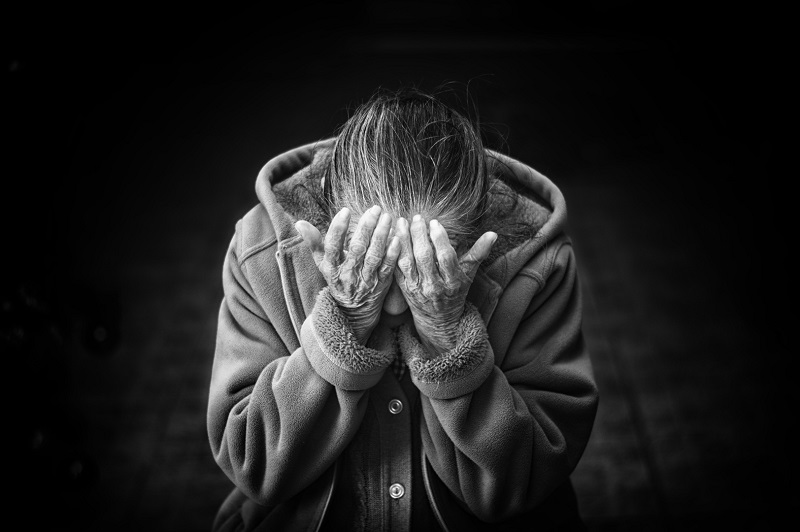
Intense Grief Worsens the Declining Health of Many Seniors
In old age, psychologists say grief is often multiplied. Coping with loss in later life can be particularly distressing because aging often coincides with declining physical health.
The difficulty of managing health problems associated with aging complicates the emotional and mental turmoil already inherent in grief.
But perhaps even what makes coping with loss in later life even more devastating is that, as people age, their social circles shrink. Dear friends have long passed. Family members have moved far away.
This means that when a beloved partner passes, many seniors confront a catastrophic absence of those support systems on which they had quietly depended throughout their lives – family, friends, and loved ones.
This type of grief affects individuals of all age groups, but it is particularly profound and challenging for those dealing with loss during their later years.
Loss can Lead to Intense and Prolonged Grief in Seniors
Scientists call it complicated grief – and although people of all ages can experience it, it is often shattering for people coping with loss in later life.
In a study published by the US National Institutes of Health, Mark Miller, an assistant professor of psychiatry at the University of Pittsburgh, says that complicated grief affects between 10 to 20 percent of grievers regardless of age.
But those coping with loss in later life are more likely to suffer complicated grief as mortality among old friends and partners looms increasingly large.
The symptoms of this kind of grief in people coping with loss in later life can be alarming and confusing, both for the senior and for members of the family.

“Couples who have aged successfully as a unit of shared responsibility for each other sometimes find that being alone without their partner’s contribution can feel overwhelming,” says Miller.
The warning signs include thoughts, feelings, or behaviours that reflect excessive concerns about the circumstances or consequences of the loved one’s passing.
Studies indicate that many individuals who are coping with loss in later life contemplate the notion that life becomes unendurable following the death of loved ones. Frequently, there is an inclination to pass away and reunite with the departed.
People Coping with Loss in Later Life Often Feel Exhausted
This kind of prolonged, intense grief in later life often manifests itself physically. It activates the body’s stress response system, which leads to a collapse in the normal functions of the brain and body.
When a person experiences a loss, the brain’s emotional centres become highly active. This triggers the release of stress hormones, primarily cortisol, into the bloodstream. Elevated cortisol levels affect various bodily functions. If cortisol levels in the bloodstream remain elevated, it can interfere with the natural sleep-wake cycle.
Loss in later life leads to difficulty sleeping, causing fatigue and stress during the day. That’s because grief also affects neurotransmitters in the brain, such as serotonin and dopamine. These perform critical functions in mood regulation and energy levels.
The emotional toll of grief on older people, combined with disrupted sleep and hormonal changes, can leave seniors feeling exhausted, empty, and isolated.

Grieving Seniors are More Likely to Experience a Decline in Mental Functions
Seniors, like others, experience profound emotions such as sadness, loneliness, anxiety, and depression following the death of a loved one. However, these feelings can be particularly overpowering when you are coping with loss in later life.
In such instances, grieving seniors might experience difficulties with concentration, memory, decision-making, and overall cognitive function.
The stress and emotional strain of coping can impact their ability to focus and think clearly. Grief can often also lead to increased social isolation, which can be especially difficult if the senior has lost a spouse. This isolation can have a huge impact on their mental health.
Seniors may even experience a diminished ability to communicate their feelings and bounce back from stress and illness.
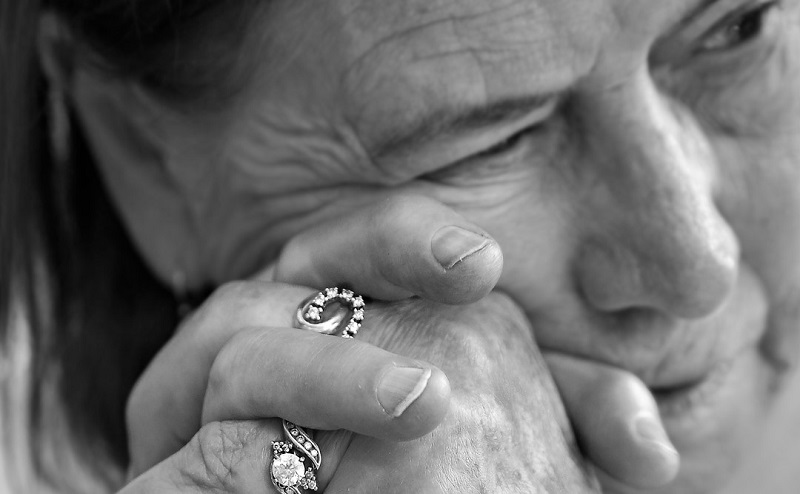
Grief Can Worsen Pre-Existing Conditions
For seniors with pre-existing health conditions like high blood pressure, diabetes, and heart disease, coping with loss in later life can be devastating. That’s because the emotional toll of grief might lead to irregular blood pressure, fluctuations in blood sugar levels, or difficulties in adhering to treatment plans.

Profound and prolonged grief in people coping with loss in later life can also trigger and exacerbate mental health conditions like depression and anxiety. These conditions, when combined with physical health issues, can create a cycle where one affects the other adversely, leading to a decline in overall well-being.
How to Cope with Intense Grief in Later Life
While grief can be overwhelming for many seniors, self-care can help them navigate the emotions that follow the loss of a loved one.
For example, exercise has been shown to regulate sleep by promoting better sleep quality. These can help counter the sleep disorders that often accompany complicated grief.
The Benefits of Exercise
Engaging in regular physical activity supports overall physical health. This strengthens the cardiovascular system, improves muscle tone and flexibility, and boosts energy levels. These benefits can help seniors better withstand the emotional toll of grief.
Regular exercise also triggers the release of endorphins, neurotransmitters that act as natural painkillers and mood elevators. These endorphins can help to alleviate feelings of sadness and provide a sense of well-being, offering a natural way to manage grief.

The Willingness to Seek Help is Key to Coping with Loss in Later Life
The first step to managing grief in one’s senior years is to acknowledge that your grief is valid, even if others may not acknowledge it. Allow yourself to grieve. Express your emotions.
That may not come easily. Many seniors alive today have come from a generation that didn’t openly discuss emotions, especially grief.
Others value their independence. They feel that sharing their grief may cause them to become a burden to others. They might perceive sharing grief as a sign of dependence or as inconveniencing others.
There might be a fear of being judged for their emotions too, or of not coping as well as others expect. This obstacle can prevent people coping with loss in later life from sharing their grief openly.
Often, overcoming these challenges is the first – and most difficult – step in the healing process.
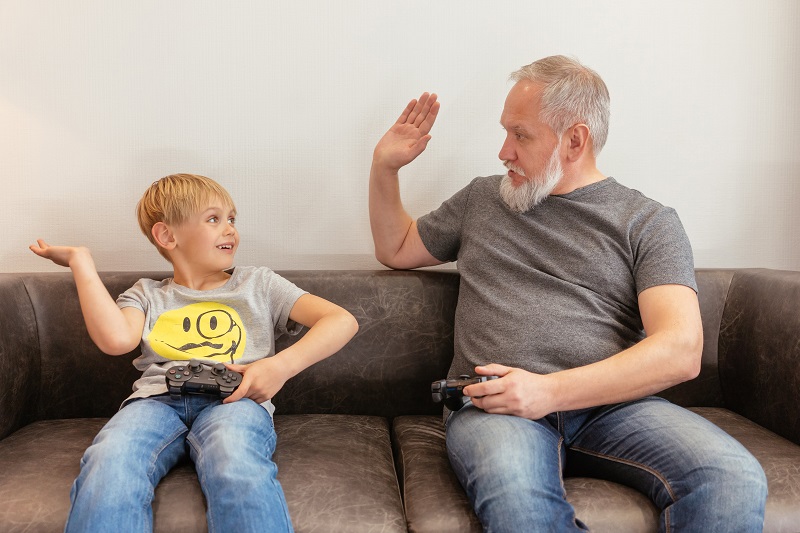
Find A Way to Express Your Appreciation and Love
If you have dealt with loss in your life, you may have had friends impose themselves into your room to hug you even though you said were all right. That is because they knew you were not.
You may have had people hold your hand when you wept. Some may even have cried along with you.
Relatives and friends may have baked cookies or cooked meals for you. Some may have even slept over to keep you company. A very busy friend may have made time to visit and have a conversation with you.
You may have received postcards, formal letters of bereavement, text messages, and emails.
You likely found those little tokens of sympathy comforting when you did not know what else to do but go through them during sleepless nights.
Why these tokens and messages help, few of us can say with any certainty. But hopefully, they did help you. Chances are, seniors who are coping with loss in later life appreciate such tokens and expressions of sympathy, too.
The grieving process cannot be hurried by family and friends, that is for sure. No matter how genuine their desire to ease the anguish of an older person coping with loss in later life, grieving takes time.
But if there is any good intention there, acknowledging the love and sympathy of others – and talking about it openly – is often helpful to both those coping with loss in later life and the people who are trying to help them.

Seeking the Right Kind of Support Can Ease the Burdens of Loss
This is why experts encourage people coping with loss in later life to talk about their grief to family members or close friends, even though they may be far away.
Regular visits or phone calls from children and other family members can provide much-needed comfort and companionship.
The Healing Benefits of Reaching Out
Conversations with family members can involve sharing memories of the departed loved one. Reminiscing about joyful times or even discussing the loss itself can be therapeutic for seniors, allowing them to process their emotions.
Speaking with family members permits seniors a way to express their feelings openly. It provides a safe space to talk about their grief without fear of judgment, helping them validate and understand their emotions.
Many communities also have support groups specifically for seniors coping with grief. These groups provide a platform to share experiences, learn coping strategies, and receive emotional support.
Professional therapists or counsellors experienced in grief counselling can offer personalized support. Many therapists specialize in helping seniors navigate grief and loss.

Why Acknowledging the Need for Help is the Best Way to Heal and Build Resilience?
Research shows that sharing emotions can improve physical health in seniors. It can correct sleep, appetite, and the overall well-being of older people who confront difficulties with loss in later life.
Sharing loss allows seniors to honour the memory of the departed. By allowing them to openly acknowledge the significance and impact of the loss, people dealing with intense grief in later life can focus on fond memories in a meaningful way.
Openly facing the reality of the loss also enables seniors to adapt to the changes in their lives. It helps them gradually adjust to a new normal without their loved ones and find ways to move forward.
The feeling of loss can persist for a long time, sometimes indefinitely. While it may become more manageable with time, certain triggers or anniversaries might bring back intense feelings of grief even after years have passed.
Finding support and building resilience will help seniors who have survived a painful loss weather the storms of grief with calm and peace in their hearts.
Ultimately, managing intense grief in later life is about openly recognizing and accepting the reality of the loss, no matter how painful that is. It’s about learning to seek and accept help from family, loved ones, and professionals.
This helps seniors accept that their loved one has passed. In turn, this acknowledgment allows them to strat processing their emotions in a reasoned and healthy way.
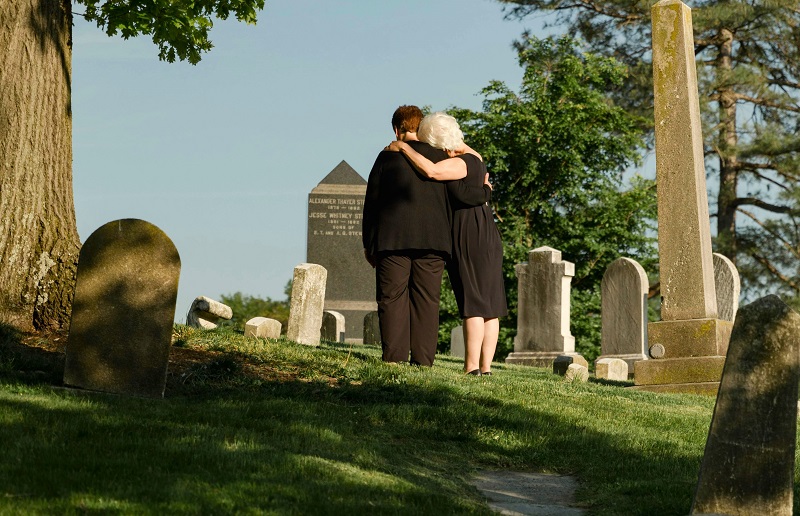
Understanding Grief in Older People
While many of us can speak candidly about death, we still have much to learn about dealing with and coping with loss in later life. What we do know is that recovery and adjustment can take much longer for people coping with loss in later life.
Grief is, of course, the natural reaction to the loss of a loved one. Few of us know what to say or do that can be truly helpful to a relative, friend, or acquaintance who is coping with loss in later life.
In fact, few older people who have suffered a painful loss know how to be most helpful to themselves. Even so, it is important to remember that there is no right or wrong in grieving a loved one.
Because we each have our way of grieving, we must learn to accept whatever shape it takes both in ourselves and in others.
By recognizing loss itself as a universal experience, perhaps we can start to understand the true nature of coping with loss in later life. Hopefully, that will help us create a more helpful, compassionate, and loving culture.
What do you think?
